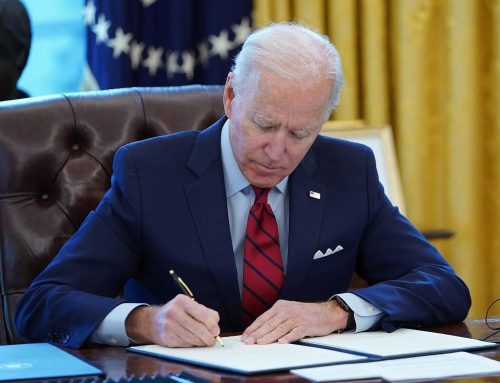Supreme Court Rules on Arizona Immigration Law
On Monday, June 25, 2012, the United States Supreme Court issued a mixed decision in the case of Arizona Et Al. v. United States, Arizona’s controversial immigration law known as SB 1070. By a 5-3 margin, the Justices upheld an injunction against provisions of the law that authorize police to arrest lawfully present immigrants suspected of committing removable offenses (Section 6), and that impose penalties under state law for immigrants who fail to carry “registration” papers (Section 3) or attempt to work without federal authorization (Section 5). However, the Court lifted the injunction against the provision of SB 1070 requiring police to determine the immigration status of people they stop or arrest if “reasonable suspicion” exists that they are in the country unlawfully (Section 2(B)).
As such, the U.S. Supreme Court struck down most of Arizona’s strict law targeting illegal immigrants, but upheld the most controversial part of it that said Arizona’s police can stop, question and briefly detain immigrants if they have reason to believe they are in the country illegally (known as the “Papers Please” provision). While police can stop people they suspect are illegal immigrants, the justices said the police have limited authority, as the federal government has the ultimate authority to decide who will be held on immigration charges and deported. Local police must check with federal immigration agents before deciding to hold the suspects. The police can notify federal agents if they have a suspect in custody, but they cannot keep them in a county jail on state charges.
Soon after Arizona Republican Governor Jan Brewer signed SB 1070 into law in 2010, the Obama administration filed suit alleging its provisions could not be enforced because they were inconsistent with, and were therefore “preempted” by, federal immigration law. Lower federal courts blocked the four provisions from taking effect, agreeing with the Justice Department that they undermined federal authority over immigration. The Supreme Court struck down the provisions of the Arizona law that would make it a crime for immigrants without work permits to seek employment; make it a crime for immigrants to fail to carry registration documents, and authorize the police to arrest any immigrant they believe has committed a deportable offense. Five justices were in the majority choosing to strike down these three provisions as intrusions on federal sovereignty and obstacles to federal law. Justice Anthony Kennedy wrote the majority opinion, joined by Chief Justice John Roberts, and Justices Ruth Bader Ginsburg, Stephen Breyer and Sonia Sotomayor. The dissenters were Justices Antonin Scalia, Clarence Thomas and Samuel Alito, who argued that the whole law should have been upheld. Justice Elena Kagan did not participate in the consideration or decision of the case.
The Supreme Court decision states: “Sections 3, 5(C), and 6 of S. B. 1070 are preempted by federal law. … Section 3 intrudes on the field of alien registration, a field in which Congress has left no room for States to regulate. … Section 5(C)’s criminal penalty stands as an obstacle to the federal regulatory system. … By authorizing state and local officers to make warrantless arrests of certain aliens suspected of being removable, §6 too creates an obstacle to federal law.”
With regard to Section 2(B), the right of police officers to demand immigration status of people they stop, the Supreme Court ruled that it “has three limitations: A detainee is presumed not to be an illegal alien if he or she provides a valid Arizona driver’s license or similar identification; officers may not consider race, color, or national origin “except to the extent permitted by the United States [and] Arizona Constitution[s]”; and §2(B) must be “implemented in a manner consistent with federal law regulating immigration, protecting the civil rights of all persons and respecting the privileges and immunities of United States citizens.” … This Court finds unpersuasive the argument that, even with those limits, §2(B) must be held preempted at this stage. … The mandatory nature of the status checks does not interfere with the federal immigration scheme. Consultation between federal and state officials is an important feature of the immigration system. In fact, Congress has encouraged the sharing of information about possible immigration violations. … The federal scheme thus leaves room for a policy requiring state officials to contact ICE as a routine matter. … It is not clear at this stage and on this record that §2(B), in practice, will require state officers to delay the release of detainees for no reason other than to verify their immigration status.”
The court’s decision appears to give states a relatively limited role in enforcing the laws against undocumented immigrants. Immigration and human rights organizations praised the Supreme Court’s decision to block the three provisions in question, but lamented the upholding of the “Papers Please” provision that enables local police to demand to see papers of people they stop or arrest. For example, Amnesty International said in a statement: “Amnesty International welcomes the Court’s decision that the ‘right to work’ and possible criminal penalties for not carrying immigration documents provisions of SB 1070 are invalid because they encroach on federal responsibilities on enforcing immigration laws. However, we are disappointed that the Court failed to draw a clearer line in the sand against racial profiling. This leaves the door open for continued challenges as ambiguities in implementation still exist.”
Attorneys at I.S. Law Firm have helped many immigrants to avoid deportation and legalize their status in the United States. To explore your immigration options, please contact us at +1-703-527-1779 or by e-mail:[email protected].





